Hippo Insurance Services Bundle
Unveiling the Owners of Hippo Insurance: Who's Steering the Ship?
Understanding the ownership of a company is paramount to grasping its strategic direction and future prospects. For Hippo Insurance, a key player in the InsurTech revolution, knowing who holds the reins is crucial. Founded in 2015, this innovative company has disrupted the homeowners insurance landscape with its tech-forward approach.
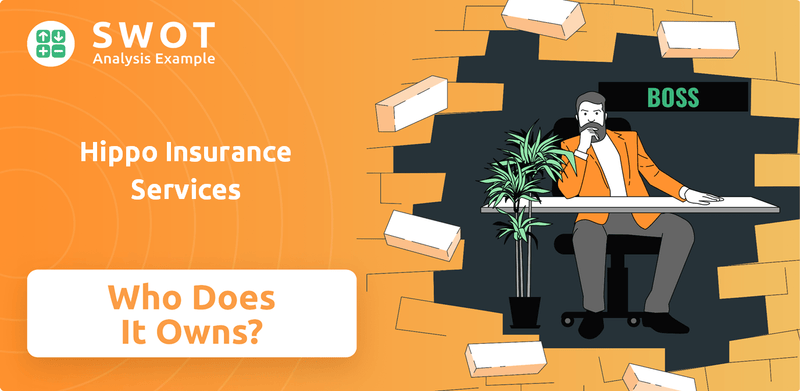
This deep dive into Hippo Insurance Services SWOT Analysis will explore the evolution of Hippo Insurance ownership, from its founding to its current status as a publicly traded entity. We'll examine the influence of early investors, the impact of going public, and the key players shaping Hippo Insurance's trajectory. Discover the forces behind the Hippo Insurance company's strategic decisions and its efforts to redefine the property insurance industry, including details on its Hippo Insurance investors and the Hippo Insurance history.
Who Founded Hippo Insurance Services?
The story of Hippo Insurance begins with its co-founders, Assaf Wand and Eyal Ronen, who launched the company in 2015. This marks the starting point for understanding the Hippo Insurance ownership structure. Assaf Wand, currently serving as CEO, brought entrepreneurial and financial expertise to the table. Eyal Ronen contributed his skills in technology and product development.
While specific initial equity allocations are not publicly available, it's typical for tech startups to grant significant early ownership to co-founders. These initial ownership shares often come with vesting schedules, which tie ownership to the founders' continued involvement in the company. This setup helps align the founders' interests with the long-term success of the business.
Early investment played a crucial role in shaping Hippo Insurance's trajectory. Several venture capital firms and angel investors provided the initial funding. These early backers provided the capital necessary for Hippo Insurance company to develop its technology platform and expand its operations. While exact shareholding percentages for these early investors are not readily available, their investments typically involved acquiring significant equity stakes.
Assaf Wand and Eyal Ronen co-founded Hippo Insurance in 2015.
Assaf Wand serves as the CEO of Hippo Insurance.
Early investors included Horizons Ventures, RPM Ventures, Propel Venture Partners, and Pipeline Capital.
Initial funding rounds were crucial for developing the technology platform.
The founders likely retained substantial influence over the company's direction.
Early investments shaped the early distribution of control.
The early focus on a technology-driven, customer-centric insurance model was key to attracting these initial investments. The founders' vision played a central role in shaping the early distribution of control. To learn more about Hippo Insurance's growth, consider reading Growth Strategy of Hippo Insurance Services. The Hippo Insurance history shows that the founders retained substantial influence over the company's direction, which was crucial in the early stages. The early backing from investors was critical in enabling Hippo Insurance to build its platform and expand its operations. While specific details on the Hippo Insurance investors and their exact shareholdings are not always public, their support was instrumental in the company's initial success.
Hippo Insurance Services SWOT Analysis
- Complete SWOT Breakdown
- Fully Customizable
- Editable in Excel & Word
- Professional Formatting
- Investor-Ready Format
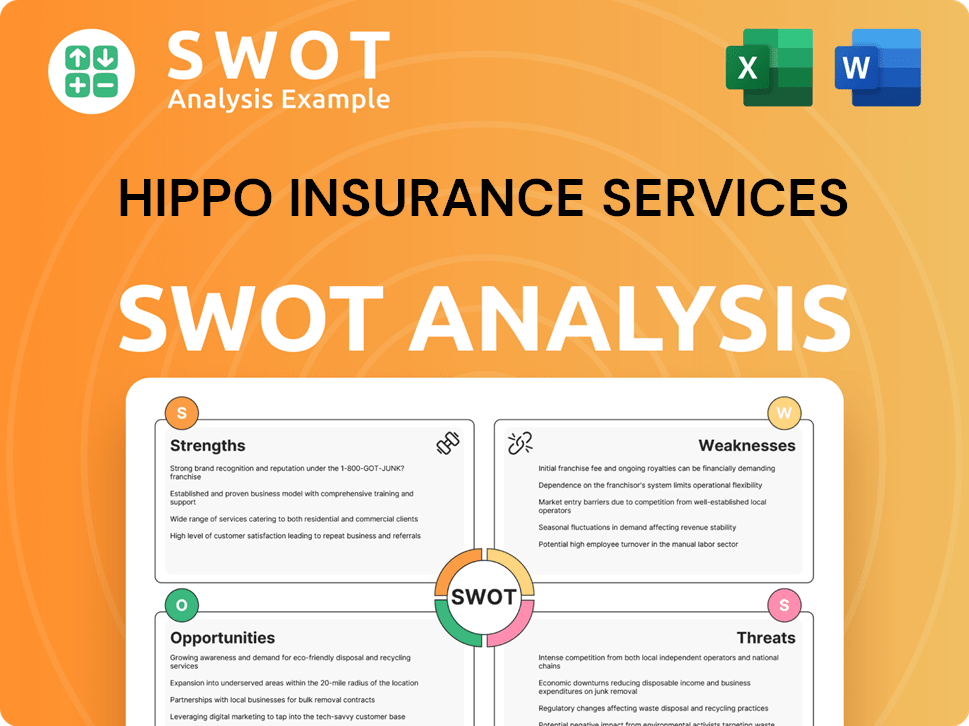
How Has Hippo Insurance Services’s Ownership Changed Over Time?
The ownership structure of Hippo Insurance Services has changed significantly since its inception. A major shift occurred when the company went public through a Special Purpose Acquisition Company (SPAC) merger with Reinvent Technology Partners Z (RTPZ) on August 3, 2021. This move transformed Hippo from a privately held startup to a publicly traded entity, broadening its investor base considerably.
The initial market capitalization following the SPAC merger was approximately $5 billion. This event marked a transition, moving ownership beyond the original founders and venture capital firms to include a wider array of institutional and individual investors. This transition also introduced increased regulatory scrutiny and a greater focus on shareholder value, influencing the company's strategic decisions.
| Event | Date | Impact on Ownership |
|---|---|---|
| SPAC Merger with RTPZ | August 3, 2021 | Hippo became a publicly traded company, expanding ownership to include a broad investor base. |
| Initial Market Capitalization | August 3, 2021 | Approximately $5 billion, reflecting the initial valuation and ownership distribution. |
| Ongoing Public Trading | 2021-2025 | Ownership continues to evolve with trading activity, with institutional investors and founders holding significant stakes. |
As of early 2025, the major stakeholders in Hippo Insurance include a mix of institutional investors, mutual funds, and the founders. SoftBank Group Corp. has been a significant institutional holder, and various asset management firms also hold substantial portions of the company's public shares. Founders Assaf Wand and Eyal Ronen maintain a notable ownership stake, reflecting their continued leadership. The company's financial performance and stock price continue to be influenced by these major shareholders and market dynamics.
Hippo Insurance's ownership structure has evolved significantly since its IPO in 2021.
- The SPAC merger with RTPZ was a pivotal event.
- Major stakeholders include institutional investors and founders.
- Ownership is subject to change due to market activity.
- The company's strategic decisions are influenced by shareholders.
Hippo Insurance Services PESTLE Analysis
- Covers All 6 PESTLE Categories
- No Research Needed – Save Hours of Work
- Built by Experts, Trusted by Consultants
- Instant Download, Ready to Use
- 100% Editable, Fully Customizable
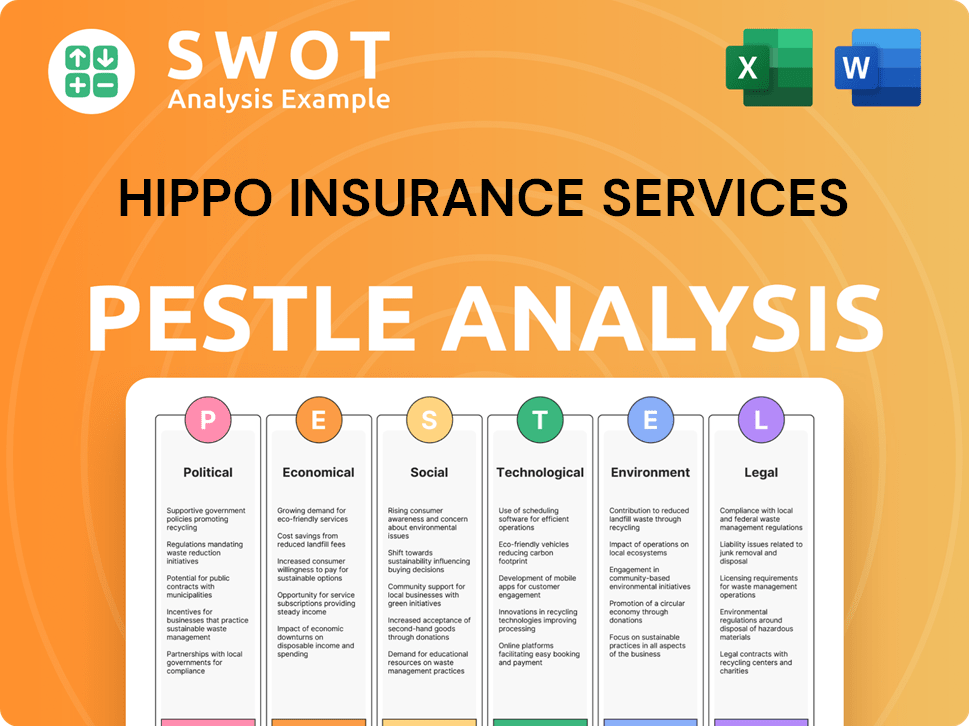
Who Sits on Hippo Insurance Services’s Board?
The Board of Directors of the Hippo Insurance Services plays a key role in its governance. As of early 2025, the board is composed of a mix of founders, representatives from major investors, and independent directors. Assaf Wand, the co-founder and CEO, typically holds a seat on the board, representing executive leadership. Board members often bring experience in technology, finance, and insurance, reflecting the company's core business. The composition of the board and the alignment of director interests with major shareholders are continuously scrutinized by investors.
The presence of representatives from significant institutional investors on the board, such as those associated with SoftBank or other large investment funds, ensures their substantial equity holdings are represented in strategic decision-making. Independent directors also play a vital role in providing objective oversight and ensuring sound corporate governance practices. The board's structure and the interests of major shareholders are constantly evaluated by investors, especially given the company's position in the insurance technology market. Understanding Hippo Insurance ownership structure is crucial for investors.
| Board Member | Title | Affiliation |
|---|---|---|
| Assaf Wand | Co-founder & CEO | |
| Representative | Director | SoftBank |
| Independent Director | Director | Independent |
The voting structure for Hippo Insurance shares generally operates on a one-share-one-vote basis, common for publicly traded companies. However, it's important to review the company's latest proxy statements (DEF 14A filings with the SEC) for any specific provisions related to dual-class shares or other arrangements that might grant certain individuals or entities outsized control. While there have been no widely publicized proxy battles or activist investor campaigns against Hippo Insurance company in recent years, the board's composition and alignment of director interests with major shareholders are continuously scrutinized by investors. This is particularly relevant for those looking into Hippo Insurance investors and the company's Hippo Insurance history.
The Board of Directors includes founders, investor representatives, and independent directors.
- Assaf Wand, co-founder and CEO, typically holds a board seat.
- Representatives from major investors, like SoftBank, are often present.
- Voting is generally one-share-one-vote, but check proxy statements.
- Independent directors provide oversight.
Hippo Insurance Services Business Model Canvas
- Complete 9-Block Business Model Canvas
- Effortlessly Communicate Your Business Strategy
- Investor-Ready BMC Format
- 100% Editable and Customizable
- Clear and Structured Layout
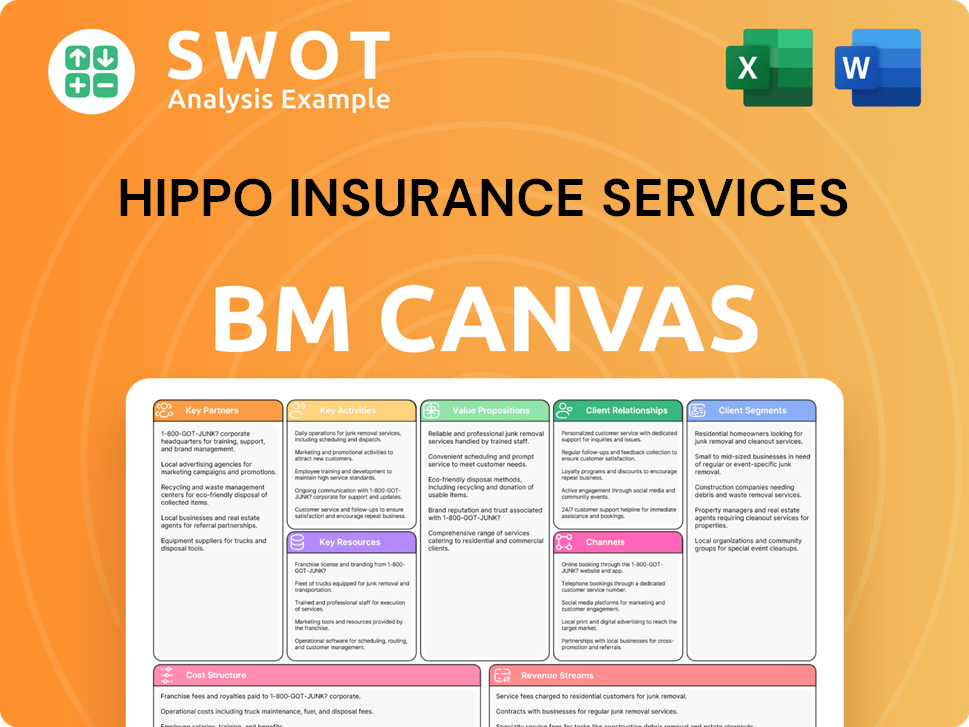
What Recent Changes Have Shaped Hippo Insurance Services’s Ownership Landscape?
Over the past few years, the ownership structure of Hippo Insurance has evolved significantly. Following its public listing via a SPAC merger in 2021, Hippo Insurance ownership transitioned to a more diversified base, including institutional and retail investors. This shift is typical for InsurTech companies as they mature and access public markets. The company's performance and strategic decisions have continued to influence investor confidence and, consequently, ownership trends.
In 2024 and early 2025, Hippo Insurance company has navigated market fluctuations, which can impact institutional ownership levels as funds adjust their portfolios. There have been no major public announcements of significant share buybacks or secondary offerings that would dramatically alter the ownership structure in the very recent past. The company's focus remains on expanding its market reach and operational performance, which indirectly influences investor confidence. Understanding the Target Market of Hippo Insurance Services is also crucial to comprehending the company's growth trajectory, which in turn impacts its ownership dynamics.
Industry trends indicate that InsurTech companies often see increased institutional ownership after their IPOs. Founder dilution is another common trend as companies raise capital. Any significant mergers, acquisitions, or leadership changes could trigger shifts in ownership. These factors will continue to shape the Hippo Insurance ownership structure as the company evolves.
Institutional ownership often increases post-IPO. Founder dilution is common as companies raise capital. Mergers and acquisitions can lead to shifts in ownership.
Market fluctuations and company performance. Strategic decisions and growth strategies. Leadership changes or significant acquisitions.
Hippo Insurance Services Porter's Five Forces Analysis
- Covers All 5 Competitive Forces in Detail
- Structured for Consultants, Students, and Founders
- 100% Editable in Microsoft Word & Excel
- Instant Digital Download – Use Immediately
- Compatible with Mac & PC – Fully Unlocked
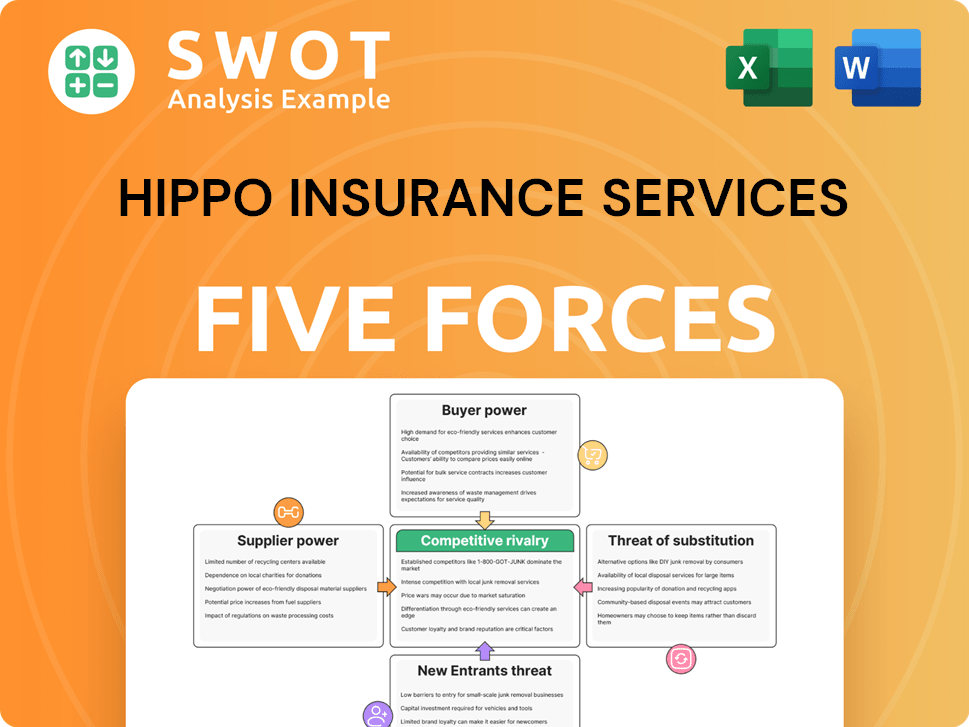
Related Blogs
- What are Mission Vision & Core Values of Hippo Insurance Services Company?
- What is Competitive Landscape of Hippo Insurance Services Company?
- What is Growth Strategy and Future Prospects of Hippo Insurance Services Company?
- How Does Hippo Insurance Services Company Work?
- What is Sales and Marketing Strategy of Hippo Insurance Services Company?
- What is Brief History of Hippo Insurance Services Company?
- What is Customer Demographics and Target Market of Hippo Insurance Services Company?
Disclaimer
All information, articles, and product details provided on this website are for general informational and educational purposes only. We do not claim any ownership over, nor do we intend to infringe upon, any trademarks, copyrights, logos, brand names, or other intellectual property mentioned or depicted on this site. Such intellectual property remains the property of its respective owners, and any references here are made solely for identification or informational purposes, without implying any affiliation, endorsement, or partnership.
We make no representations or warranties, express or implied, regarding the accuracy, completeness, or suitability of any content or products presented. Nothing on this website should be construed as legal, tax, investment, financial, medical, or other professional advice. In addition, no part of this site—including articles or product references—constitutes a solicitation, recommendation, endorsement, advertisement, or offer to buy or sell any securities, franchises, or other financial instruments, particularly in jurisdictions where such activity would be unlawful.
All content is of a general nature and may not address the specific circumstances of any individual or entity. It is not a substitute for professional advice or services. Any actions you take based on the information provided here are strictly at your own risk. You accept full responsibility for any decisions or outcomes arising from your use of this website and agree to release us from any liability in connection with your use of, or reliance upon, the content or products found herein.